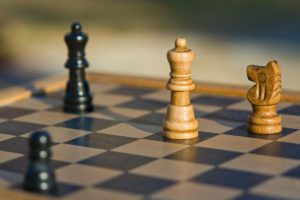In the heat of a local tournament, a player in customisable basketball jerseys paces the sidelines, calling out plays like a seasoned tactician. Across town, another contender pores over rare finds at a trading card store, building a deck not just of powerful cards but of clever combinations that win matches. While vastly different on the surface, both experiences speak to a universal truth: games are more than entertainment—they’re training grounds for strategic brilliance.
Thinking Ahead: The Chessboard Mentality
Chess is the classic example when it comes to mastering strategy. With each piece serving a different purpose and each move potentially opening or closing a path to victory, players learn the value of foresight. In life, as in chess, those who can visualise outcomes several steps ahead tend to avoid pitfalls and seize opportunities faster. From resource management to anticipating your opponent’s next move, the lessons taught by chess translate seamlessly to professional planning and decision-making.
Resource Management in Card Games
 Collectable card games like Pokémon teach players how to maximise limited resources under uncertain conditions. You may have drawn a poor hand, but the key to victory lies in how you use what you have. This trains the brain to assess risk, allocate resources wisely, and adapt quickly to a changing environment. The unpredictability of card draws mimics real-world uncertainty, where rarely is every decision backed by complete information.
Collectable card games like Pokémon teach players how to maximise limited resources under uncertain conditions. You may have drawn a poor hand, but the key to victory lies in how you use what you have. This trains the brain to assess risk, allocate resources wisely, and adapt quickly to a changing environment. The unpredictability of card draws mimics real-world uncertainty, where rarely is every decision backed by complete information.
Real-Time Strategy: Acting Under Pressure
Video games in the real-time strategy (RTS) genre—such as StarCraft or Age of Empires—require players to multitask, prioritise, and act quickly under pressure. From managing economies to deploying troops at just the right moment, players are constantly balancing the long game with immediate action. These fast-paced, decision-heavy environments mimic high-stakes scenarios in business or project management where time, attention, and outcomes are tightly interlinked.
Players are also trained to quickly learn from their mistakes. A poorly timed build order or overlooked enemy unit can mean disaster. But the fast-paced feedback loop means players iterate rapidly, sharpening both their skills and their mental resilience.
Sports and Tactics: Beyond the Court
Team sports, especially those with intricate playbooks like basketball or football, offer real-world lessons in coordination and situational awareness. Whether you’re part of a local team or watching from the sidelines, you’ll notice that each play has a goal—and a counter. Strategy in sports often means thinking as a unit, not just an individual. It’s about timing, positioning, and anticipating the opposition’s moves.
Great coaches and captains aren’t always the most physically talented—they’re the best strategists. They read the flow of the game, adapt tactics mid-match, and align their team toward a common objective. These are the same qualities valued in business leaders and managers, where teamwork and adaptability often outweigh raw talent.
Board Games and Pattern Recognition
Modern board games like Settlers of Catan, Risk, or Ticket to Ride bring out a different dimension of strategic thinking: pattern recognition and negotiation. Players who consistently win often do so not because they rely on luck but because they understand probabilities, recognise long-term patterns, and know how to influence other players without drawing suspicion.
In Catan, for example, knowing when to trade, what to build, and how to negotiate can outweigh having the best starting position. The skill lies in spotting opportunities that others overlook and creating value through clever social play. This blend of strategic foresight and interpersonal skills makes these games particularly effective in sharpening both logic and emotional intelligence.
Cooperative Play and Strategic Alignment
Not all games are about competition. Cooperative games like Pandemic or Gloomhaven demand a different kind of strategy—one that prioritises alignment and shared decision-making. Players must communicate effectively, agree on the best course of action, and adjust to new developments on the fly. These games simulate team-based environments where success hinges on clear roles, trust, and flexible strategy.
The beauty of cooperative play lies in its real-world parallel: many of life’s challenges aren’t about beating others but working together to overcome obstacles. These games foster a mindset of shared leadership and collaborative problem-solving—essential skills in both personal and professional contexts.
The Psychology of Play
Across all formats, games challenge the way we process information and make decisions. They ask us to evaluate not just the best course of action but the right one for the given context. Do you bluff? Do you pivot strategies? Do you sacrifice a short-term win for a long-term advantage?
Over time, playing strategic games helps develop what psychologists call “cognitive flexibility”—the ability to switch perspectives, think creatively, and respond to novel challenges. Whether it’s through dice rolls or digital commands, games create low-risk environments to test high-stakes thinking.
Bringing Game Strategy Into Daily Life
Once you start viewing games as more than just recreation, the strategic benefits become clear. The lessons of anticipation, planning, adaptability, teamwork, and decision-making are transferable to almost every aspect of life. Whether managing a household budget, planning a career path, or handling complex social dynamics, these skills empower better choices.
Consider how different games can support different areas of personal growth:
– Chess and logic puzzles enhance deliberate thinking and patience.
– Trading card games encourage research, risk analysis, and adaptive planning.
– RTS and simulation games build time management and prioritisation.
– Team sports teach communication, strategy under pressure, and coordination.
– Board and cooperative games train pattern recognition and group strategy.
Whether you’re strategising on the basketball court or fine-tuning your favourite deck, every game played sharpens your ability to think critically, make good decisions, and collaborate effectively.
The best part? You don’t need to be a grandmaster or world champion to benefit. Simply by playing, reflecting, and engaging thoughtfully, you’re levelling up far more than your high score—you’re developing a mindset that wins in the game of life.
